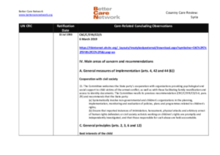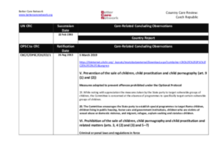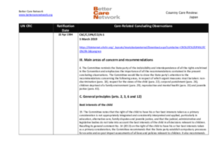Displaying 391 - 400 of 1796
This book offers a comprehensive overview of the newest contributions to the literature on leaving care in relation to theory, in addition to the Theory of Emerging Adulthood, while also featuring cutting-edge research and best practices that support adjustment across a range of domains for this population.
The Opening Doors for Europe’s Children – a pan-European campaign that advocates for strengthening families and ending institutional care – released 16 country fact sheets about the progress with the transition from institutional to family- and community-based care (also known as deinstitutionalisation) in 2018.
This article explores the history of strained relations between the Norwegian Child Welfare Services (CWS) and various migrant groups.
This study aimed to identify the interrelationships of risk and protective factors, job satisfaction and burnout to child protection workers' intent to leave, the relative impact between job satisfaction and burnout on intent to leave, and their mediating roles for the risk and protective factors.
This article aims to identify risk and protective factors associated with families returning to the US child welfare system within a social ecological framework, to identify gaps in the current literature, and to discuss areas for future research.
Drawing on in-depth interviews with fifteen community workers, who represent nine agencies assisting families with child protection issues in a small jurisdiction in Australia, the authors of this article show how the stigma attached to ‘bad’ parents is passed on to the community workers who are supporting them.
This country care review includes the care-related Concluding Observations adopted by the Committee on the Rights of the Child. The Committee's recommendations on the issues relevant to children's care are highlighted, as well as other care-related concluding observations, ratification dates, and links to the Universal Periodic Review and Hague Intercountry Adoption Country Profile.
This country care review includes the care-related Concluding Observations adopted by the Committee on the Rights of the Child and the Committee on the Rights of Persons with Disabilities. The Committees' recommendations on the issues relevant to children's care are highlighted, as well as other care-related concluding observations, ratification dates, and links to the Universal Periodic Review and Hague Intercountry Adoption Country Profile.
This country care review includes the care-related Concluding Observations adopted by the Committee on the Rights of the Child.
This research addresses one of the most pressing and controversial issues facing child welfare policymakers and practitioners today: the dramatic overrepresentation of Indigenous families in North American public child welfare systems. The article presents a successful model of inclusive education: the Center for Regional and Tribal Child Welfare Studies (the Center) at the University of Minnesota, Duluth, School of Social Work.



